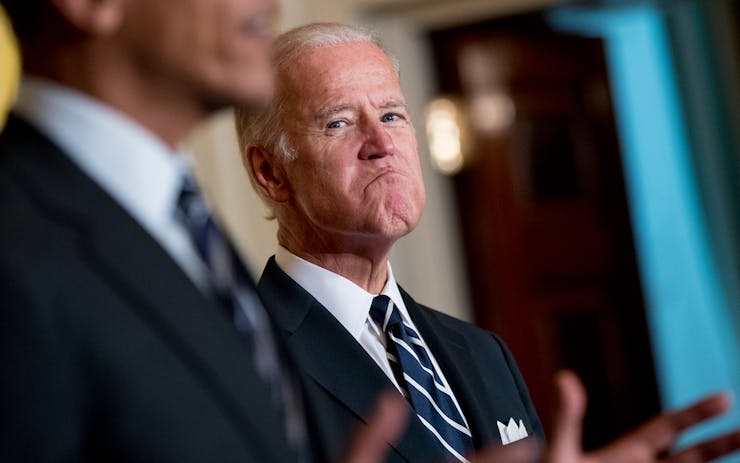Those who thought former Vice President and presumptive Democratic presidential nominee Joe Biden might be forced to evolve on cannabis by the far-left Bernie Sanders coalition: You may now exhale. Uncle Joe ain’t budging.
On Monday, the Biden campaign released a six-part policy manifesto: “Lift Every Voice: The Biden Plan for Black America.” In it, Joe Biden describes his administration’s plan to “advance the economic mobility of African Americans and close the racial and wealth and income gaps.”
About three-quarters of the way into the document, included under the subhead “Strengthen America’s commitment to justice,” Biden quietly addresses an issue progressives have been badgering him about for over a decade: marijuana reform. The new policy states:
“He will…decriminalize the use of cannabis and automatically expunge all prior cannabis use convictions, and end all incarceration for drug use alone and instead divert individuals to drug courts and treatment.”
Aside from the questionable choice to address the “use of cannabis” in a plan intended for African-Americans—and failing to note that white Americans use cannabis at similar rates, while Black people are four times more likely to be arrested for it—Biden’s plan is problematic for a number of reasons.
Decriminalization isn’t enough
Perhaps a man of Biden’s age who just months ago questioned whether or not marijuana was a “gateway drug” deserves some credit for making progress. And while decriminalization could help put an end to the harsh, unfair enforcement policies of prohibition, the shortcomings of simple decriminalization are well-trodden territory in the industry.
“While decriminalization is a preferable policy compared to the status quo of prohibition, it does not go nearly far enough to address the harms that the war on marijuana has caused for decades,” said Violet Cavendish, communications manager for the Marijuana Policy Project.
Although it might cut down on arrests and incarceration, decriminalization still allows police officers to detain and question people. A 2016 report by Drug Policy Action pointed out that decrim may even make cops more likely to stop people of color, because it reduces their administrative burden. California experienced this phenomenon after decriminalizing in 1976.
Okay to possess, but illegal to purchase
Decriminalization alone also fails to provide a pathway to economic empowerment needed by minority communities that have been the primary victims of prohibition enforcement, despite equal use across races. A recent study by MJBiz Daily indicated more than four in five cannabis businesses are white-owned. Progress on fixing that number was at a crawl even before the coronavirus.
“It hasn’t worked,” Politico said of Massachusetts’ effort to ensure the legal cannabis industry would benefit those besides “already-wealthy white men.”
Cannabis as treatment, or treatment for cannabis?
In countries like Israel and Italy, large-scale studies are being conducted into the potential therapeutic benefits of cannabinoids. Meanwhile, Joe Biden says he will “divert individuals to drug courts and treatment.”
It’s unclear whether this includes cannabis users, but it doesn’t seem likely that a failure to update federal weed laws will do anything but inhibit further research.
Francis Collins, director of the National Institutes of Health, testified earlier this year that the “various limitations of Schedule I limits” were a “big deterrent” into research into marijuana. Cannabis industry officials have been trying to make that point for many years.
“We need to deschedule cannabis so we can regulate the substance at the federal level and provide states with guidance and remove barriers to research,” said Morgan Fox, director of media relations for the National Cannabis Industry Association.
He wrote the damn crime bill!
It’s tough to credit Biden, who’s frequently called a “drug warrior,” and “the architect of America’s War on Drugs,” for taking steps towards reform when he is personally responsible for so much that needs changing.
Just before addressing cannabis law, Biden’s plan states:
“He will end, once and for all, the federal crack and powder cocaine disparity.”
That would be the height of irony, because Biden was the person who created that disparity in the first place.
Worked to increase incarceration
As a senator in the 1980s, Biden was all too eager to ramp up America’s incarceration rate. A month after the tragic death of basketball star Len Bias in June 1986, Biden was the one who convened a US Senate hearing with Dr. Robert Byck, a Yale professor who warned that crack would soon be the scourge of America. In 1986, Biden and Strom Thurmond co-authored the Anti-Drug Abuse Act, which created the infamous 100-1 sentencing disparity between crack and cocaine possession.
“Legalization can help us begin to dismantle racially disproportionate policing and incarceration, while making space for black and brown people to enter the regulated marijuana market,” said Maritza Perez, director of the office of national affairs at Drug Policy Action.
‘A half-measure at best’
Jason Ortiz, president of the Minority Cannabis Business Association, agreed, calling Biden’s policy outline “a half-measure at best” in the context of the United States’ prolonged proxy war on black and brown communities carried out through the selective enforcement of prohibition.
And the current Democratic nominee was once proud of his role in it.
“Every major crime bill since 1976 that’s come out of this Congress, every minor crime bill, has had the name of the Democratic senator from the State of Delaware: Joe Biden,” said the man who now says his “ambition matches the scale of the challenge” faced by African-Americans.
Owning his past
To his credit, Biden has owned up to his past misgivings. During a 2008 Congressional hearing, Biden admitted being “part of the problem,” and in March of this year he clarified that he doesn’t still believe marijuana is a gateway drug.
Derrick Martin, president and CEO of the National Association for the Advancement of Colored People (NAACP), said he was “encouraged by the efforts of Vice President Joe Biden to convene a call to highlight and uplift the often overlooked plight of African-Americans.”
We’ll see in November if Black voters will similarly lift up the former vice president at the polls.





